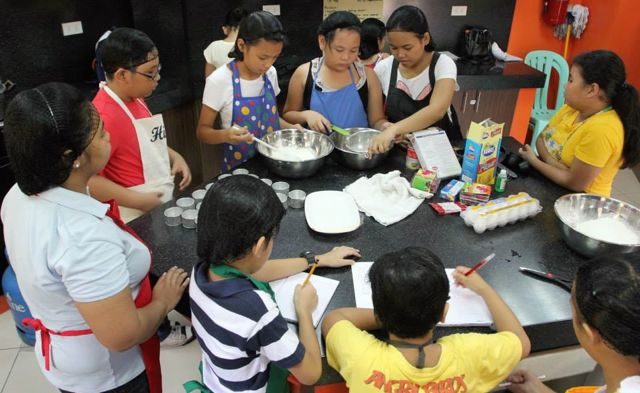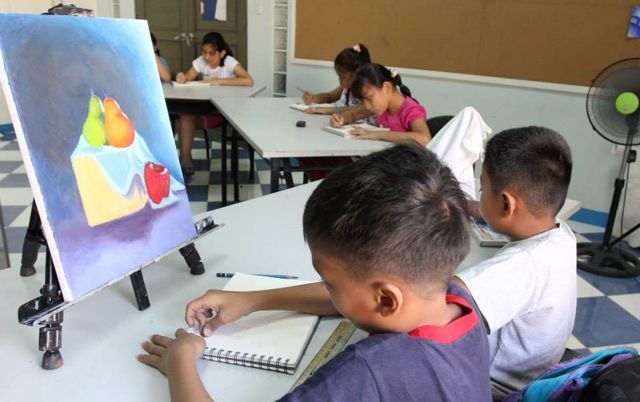SUMMARY
This is AI generated summarization, which may have errors. For context, always refer to the full article.

MANILA, Philippines – A city where children finish school, discover their talents, and get the right support and care from their community: this, according to Maria Desiree David, is what Pasig City aspires to be.
David heads the gender and development office of Pasig, recently recognized as the most child-friendly city in the National Capital Region (NCR).
It’s now in the running to win the 2015 Presidential Award for the Most Child-Friendly City in the highly urbanized category, competing with the cities of Davao, Puerto Princesa, Cagayan de Oro, and Bacolod. (READ: Does your local government protect children?)
The awards ceremony is set on Friday, May 8.
Pasig has a variety of programs and services geared towards the youth. The city runs its own children’s hospital, Child’s Hope, and conducts regular feeding programs and educational workshops. Social workers also hold training sessions with children and their parents.
David said the goal is to engage teachers, parents, and barangay leaders to work together to create a child-friendly community.
“We want a holistic approach in the development of the children, to make sure that they aren’t deprived of social services,” David said.
Pasig, home to more than 660,000 residents, scored the highest points in the Child-Friendly Local Governance Audit (CFLGA), which aims to gauge the programs implemented by local governments to promote children’s welfare.
Fun and educational
To get more children to stay in school, Pasig’s social welfare units are constantly looking for innovative ways to make their projects both fun and educational.
“Pinapaintindi namin ang kahalagahan ng edukasyon, pero hinahanap din namin ang kiliti ng out-of-school youth,” David said. “Gusto naming maging masaya ang experience, ma-enjoy rin nila ang kabataan nila.”
(We make them understand the importance of education, but we are also looking for ways to attract the out-of-school youth. We want them to have a fun experience so that they can enjoy their youth.)
The fun factor comes in the form of the city’s summer programs. Pasig has its own youth development center, which serves as the venue for elementary and high school students to try their hand in arts and crafts, cooking activities, sports, and music lessons. The city is also pursuing a partnership with Ballet Philippines, David added.
“We’re trying to address drop-outs and out-of-school youth through these programs, to help them discover their skills and talents,” David said.

For children in conflict with the law and those in need of special protection, the city also provides rehabilitative programs, recreational facilities, and health services in Bahay Aruga, the first 24-hour residential care facility in NCR.
The 3-storey care facility in Barangay Pinagbuhatan, which can house up to 80 children, is equipped with educational and recreational facilities such as a library, lecture room, and auditorium.
Collaborative approach
The work of developing the children’s skills and talents is not just the responsibility of the local government. To provide children the right opportunities, David cited the importance of involving the parents.
As part of Pasig’s child protection services, David’s office regularly holds meetings and workshops with parents and teachers to educate them about children’s rights.
In these workshops, social workers conduct psychological training that emphasizes positive discipline, a model that focuses on good behavior while getting rid of bad behavior without resorting to physical or verbal abuse.
David said the feedback on the programs has been encouraging.
“We have a participatory partnership with the parents. They are aware of their responsibility,” David said.
She added that there has been public clamor for the city to continue the programs.
“The teachers and parents are more aware of children’s rights. We have lectures with expert resource speakers as well as role-playing workshops. Teachers have been telling us that both parents and students have become more open-minded,” David said.
With the 2015 presidential awards just a couple of days away, David said they would be honored if Pasig wins.
“We’re working hard to achieve our goals. We want the children of Pasig to have a happy childhood, no matter their personal circumstances,” she said. – Rappler.com
Add a comment
How does this make you feel?
There are no comments yet. Add your comment to start the conversation.